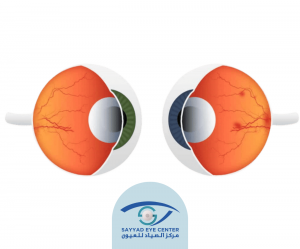
What is Diabetic Retinopathy?
Diabetic retinopathy is an eye disease caused by high blood sugar levels that damage the retina’s blood vessels. These vessels may leak, close off, or develop abnormal new growth, all of which can affect vision.
Stages of Diabetic Retinopathy:
- Non-Proliferative Diabetic Retinopathy (NPDR):
- The early stage of diabetic retinopathy.
- Can lead to macular edema (swelling in the macula), causing blurry vision.
- Blood vessel closure can reduce blood flow to the macula, further impairing vision.
- Proliferative Diabetic Retinopathy (PDR):
- The advanced stage, where new, fragile blood vessels (neovascularization) grow on the retina.
- These vessels may bleed, causing floaters or even a complete blockage of vision.
- Scar tissue from these vessels can lead to retinal detachment and severe vision loss.
Symptoms of Diabetic Retinopathy:
- Increased floaters in vision.
- Blurry or distorted vision.
- Dark areas or blind spots in the visual field.
- Poor night vision and faded colors.
- In the early stages, symptoms may not be noticeable.
Diagnosis of Diabetic Retinopathy:
- Dilated Eye Exam: Eye drops are used to widen the pupil, allowing the ophthalmologist to examine the retina.
- Fluorescein Angiography: A dye injected into the arm highlights retinal blood vessel issues.
- Optical Coherence Tomography (OCT): Provides detailed images of the retina to detect and measure macular swelling.
Treatment Options for Diabetic Retinopathy:
Medical Control:
- Maintain blood sugar and blood pressure levels as recommended by your doctor.
- Good control can slow disease progression and may improve vision.
Medications:
- Anti-VEGF injections (e.g., Avastin, Eylea, Lucentis) reduce macular swelling and improve vision.
- Steroids may also be used in certain cases.
- The frequency of injections will be determined by your doctor.
Laser Surgery:
- Seals leaking blood vessels to reduce retinal swelling.
- Multiple sessions may be required.
Vitrectomy:
- A surgical procedure to remove vitreous gel and blood from the back of the eye.
- Scar tissue removal may also be necessary in advanced cases to restore vision.
Preventing Vision Loss from Diabetes:
- Maintain good blood sugar control and follow your doctor’s instructions.
- Treat high blood pressure to protect retinal blood vessels.
- Schedule regular dilated eye exams with an ophthalmologist.
- Report any vision changes to your doctor immediately.
- Early treatment is the most effective way to prevent vision loss caused by diabetic retinopathy.
Managing diabetes effectively and seeking prompt treatment can protect your vision and prevent severe complications.

